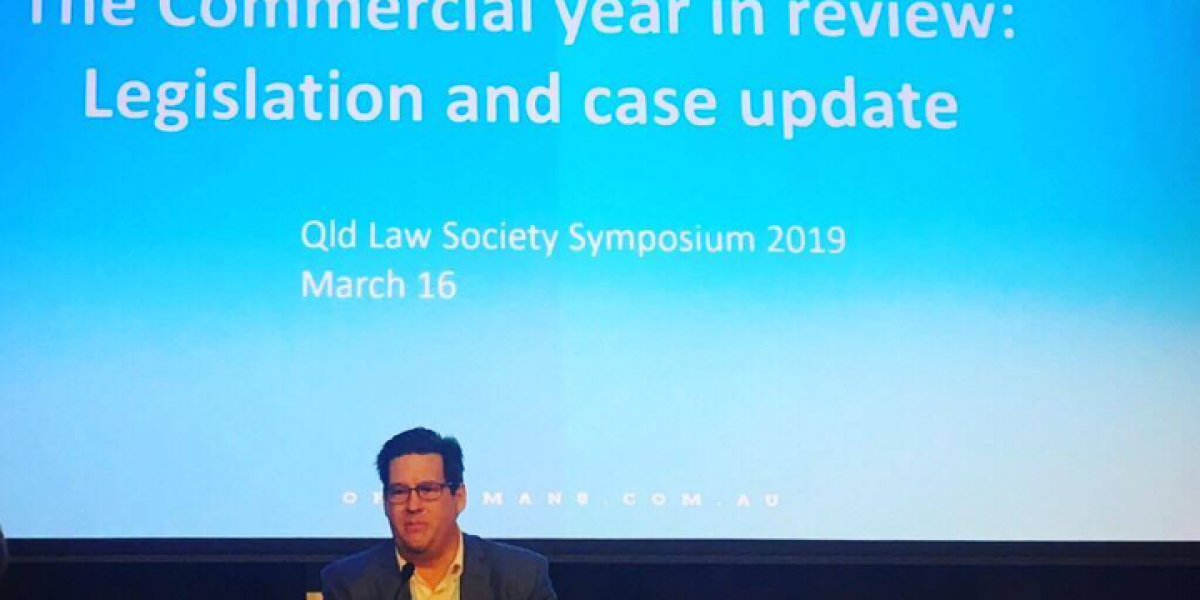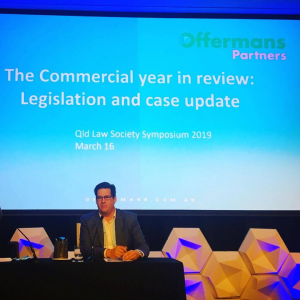



“The value of assets managed by trusts isn’t an issue as such; however, the concern is what do owners and operators do to extract the value in those trusts if things don’t go according to plan?”
It was an absolute privilege to present on Saturday at the 2019 Qld Law Society Symposium. I was lucky enough to sit on a panel with Greta Burkett of Clayton Utz and Craig Wappett from Johnson Winter and Slattery. Our session was “the commercial year in review”.
My area of the panel discussion dealt with three matters which, in my opinion, have much broader implications than first impressions might suggest. Those issues were:
- The current anti-phoenix legislation introduced into the Federal Parliament on 13 February this year;
- The ongoing uncertainty surrounding insolvent trustees of trading trusts; and
- The recent decision of the NSW Supreme Court in the matter of Seymour Whyte Constructions Pty Ltd v Ostwald Bros Pty Ltd (In liquidation) [2019] NSWCA 11.
One of the things that I love about doing these presentations is the time you’ve got to spend deep diving into a topic that you might ordinarily pay cursory attention to during the day to day grind. Having been forced to that place, I actually learnt a hell of lot more than I expected and saw connections to the broader issues I didn’t expect.
Rather than try to condense the session into one post, this will be the first of three articles on the topics I discussed. Let’s rip the band aid off and start with Trusts.
Insolvency professionals and their advisors will be more aware than most of the issues that insolvent trustee companies present to our economy. Trust structures have traditionally been incredibly popular with accountants and lawyers when structuring a new business.
In the most recently published ATO statistics (for the 2015-2016 FY) there were more than 800,000 trusts controlling over $3.1 trillion worth of assets in Australia. Those same trusts accounted for $349.2 billion in revenue. This is a huge segment of our economy. Of those trusts, 40.77% of those trusts are classed as micro or small. The numbers show the lion’s share of our wealth creation is tied up with small business owners trading through trust structures. These figures are probably understated in 2019 terms as the use of SMSFs has exploded in recent years.
The value of assets managed by trusts isn’t an issue as such; however, the concern is what do owners and operators do to extract the value in those trusts if things don’t go according to plan?
This isn’t just an issue for insolvency professionals. Every business which interacts with businesses operated by trustees needs to make sure that the counter party to their transaction is clear. Are you supplying to a company trading in its own right or is it the trustee of a trust? The answer to that question could have immense ramifications if that company becomes insolvent.
It appears settled law that trust assets can only be applied to pay trust debts. If you have supplied a trustee and cannot show that it was trading in its capacity as a trustee, you run a heightened risk of missing out in any subsequent insolvency.
Without going into a very boring lesson on the interaction of the law of equity, common law and statue to discuss why, it is enough to say Australia desperately needs our Federal Government to legislate in this area to provide much more certainty on how value is to be extracted from an insolvent trading trustee.
Admittedly the Commonwealth through its insolvency workhorse, the Fair Entitlements Guarantee team at the Department of Jobs and Small Business, has been doing a mountain of heavy lifting on trying to bring clarity via a series of actions in the Courts.
The recent Full Court decision of Jones (Liquidator) v Matrix Partners Pty Ltd, in the matter of Killarnee Civil & Concrete Contractors Pty Ltd (in liq) [2018] FCAFC 40 (“Killarnee”) and the Victorian Supreme Court decision of Commonwealth v Byrnes (in their capacity as joint and several receivers and managers of Amerind Pty Ltd (recs and mgrs apptd) (in liq)) [2018] VSCA 41 (“Amerind”) closed a number of areas of confusion. They have though in turn highlighted the glaring need for legislative intervention by what they couldn’t agree on.
Both Killarnee and Amerind are subject to High Court Appeals and it is hoped that those future decisions will provide some clearly needed clarity on the treatment of the proceeds of trust assets held by insolvent trusts.
Small business, and more particularly those that do business with SMEs such as financiers, need absolute clarity on this issue. We have a banking environment where many financiers are looking for reasons not to lend to SMEs. Questions over the recovery of monies lent do nothing to encourage the lending so desperately needed.
Our economy is underpinned on the ability to recycle stranded and distressed capital back into the general economy as quickly and as cheaply as possible. The fetters currently placed upon repatriating trust assets must be shattered as a matter of urgency.